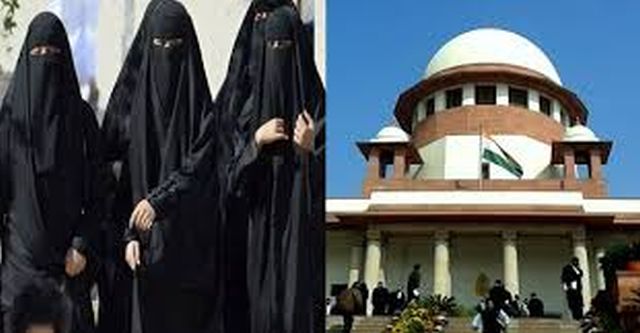
by admin | May 25, 2021 | News, Politics

Representational Image
Ahmedabad : The Gujarat High Court on Wednesday issued a show-cause notice to the state government seeking an explanation for using an online examination form for the Class X and XII board examinations, taken by the Gujarat Secondary and Higher Secondary Education Board (GSHSEB), to collect data and segregate students of Muslim community.
The notice was issued following a PIL filed by K.R. Koshty, who alleged that the BJP-ruled Gujarat government was resorting to religious-profiling of students from Muslim community appearing for the board exams.
Koshty also challenged Gujarat government’s mandatory online forms for the board exams, arguing that Internet connectivity in many parts of the state was poor. According to the PIL, the forms also seek Aadhaar details which is against the Supreme Court’s recent judgement.
The state government has been collecting data for the last five years of Muslim students appearing for the board exams, the state Education Minister had said on Tuesday.
A division bench of acting Chief Justice Anant Dave and Justice Biren Vaishnav sought replies from the state government, Gujarat Secondary and Higher Secondary Education Board (GSHSEB) and the Unique Identification Authority of India (UIDAI) by December 6.
—IANS

by admin | May 25, 2021 | World
 Paris : French anti-terrorism units have detained a group of ultra far-rightists suspected of planning assaults against Muslim community in the country, Interior Minister Gerard Collomb has said.
Paris : French anti-terrorism units have detained a group of ultra far-rightists suspected of planning assaults against Muslim community in the country, Interior Minister Gerard Collomb has said.
Collomb on Sunday wrote on Twitter: “Arrest of individuals linked to the ultra-right, suspected of acting,” Xinhua news agency reported.
During police raids in Paris region, Corsica Island and cities in central and southwestern France, ten followers of radical far-right movement were detained at the weekend as part of an inquiry opened on June 14 into plans of attacks targeting Muslims, Le Parisien newspaper reported, citing a source close to the investigation.
Aged between 32 and 69 years, the suspects planned “a violent attack with ill-defined outlines at this stage, targeting people of Muslim faith,” it said.
The 10 men, among them a retired police officer, were unknown to the police and were placed into custody for 96 hours.
—IANS

by admin | May 25, 2021 | News, Politics
 New Delhi : The Supreme Court on Monday sought the Central government’s response on a plea challenging the constitutional validity of the practice of polygamy, nikah halala (a requirement for a divorced couple to remarry), nikah mutah (temporary marriage in the Shias) and nikah misyar (short-term marriage among Sunnis) amongst the Muslim community.
New Delhi : The Supreme Court on Monday sought the Central government’s response on a plea challenging the constitutional validity of the practice of polygamy, nikah halala (a requirement for a divorced couple to remarry), nikah mutah (temporary marriage in the Shias) and nikah misyar (short-term marriage among Sunnis) amongst the Muslim community.
A bench of Chief Justice Dipak Misra, Justice A.M. Khanwilkar and Justice D.Y. Chandrachud said the matter would be heard by the constitution bench, and directed that the matter be placed before the Chief Justice for setting up of an appropriate bench.
In addition to the notice missed to the Central government and others, the court ordered that a copy of the petitions be served on a Central agency so that it can apprise the office of Attorney General.
The court also permitted advocate V.K.Biju appearing for Kolkata based Muslim Women Resistance Committee to move an impleadment application in the case. He was permitted to be associated with any of the four petitions before the court.
Seeking response from the Central government and other respondents, the court did not include Law Commission as one of the respondents which was made a party by petitioner Nafisa Khan.
Issuing notice, the court noted the grounds stating that though these practices, which come within the domain of Muslim personal law, were not immune from judicial review under the Constitution.
The court has been moved by Sameena Begum, Nafisa Khan, Moullium Mohsin and BJP leader and advocate Ashwini Kumar Upadhyay challenging the practice of polygamy, nikah halala, nikah mutah and nikah misyar on the grounds of these being violative of Article 14, Article 15 and Article 21 of the Constitution.
Article 14 guarantees equality before law, Article 15 prohibits discrimination on grounds of religion, race, caste, sex or place of birth and Article 21 guarantees protection of life and personal liberty.
Telling the court that different religious communities are governed by different personal laws, Upadhyay has contended that “there could be no dispute, that different religious communities can have different laws, but personal laws must meet the test of constitutional validity and constitutional morality, in as much as, they cannot be violative of Articles 14, 15,21 of the Constitution”.
Pointing to the “appalling” affect of polygamy and nikah halala and other practices on the Muslim women, senior counsel Mohan Parasaran told the court that the 2017 judgement which had held instant triple talaq as unconstitutional had left these two issues open and did not address them.
The five judge constitution bench headed by Chief Justice J.S.Khehar (since retired) by majority judgment in 2017 had said: “Keeping in view the factual aspect in the present case, as also, the complicated questions that arise for consideration in this case (and, in the other connected cases), at the very outset, it was decided to limit the instant consideration, to ‘talaq-e-biddat’ – triple talaq.”
“Other questions raised in the connected writ petitions, such as, polygamy and nikah halala (-and other allied matters), would be dealt with separately. The determination of the present controversy, may however, coincidentally render an answer even to the connected issues,” it has said.
A Muslim husband is allowed to have more than one wife.
Under nikah halala, if a Muslim woman after being divorced by her husband three times at different instances wants to go back to him, then she has to marry another person and then divorce the second husband to get re-married to her first husband.
—-IANS

by admin | May 25, 2021 | News, Politics
 New Delhi : The Supreme Court on Monday sought Centre’s response on a plea challenging the constitutional validity of the practice of polygamy and nikah halala amongst the Muslim community.
New Delhi : The Supreme Court on Monday sought Centre’s response on a plea challenging the constitutional validity of the practice of polygamy and nikah halala amongst the Muslim community.
A bench of Chief Justice Dipak Misra, Justice A.M. Khanwilkar and Justice D.Y. Chandrachud said the matter would be heard by the constitution bench.
The court directed that the matter be placed before the Chief Justice for setting up of an appropriate bench.
Appearing for one of the petitioners, senior counsel Mohan Parasaran told the court that the 2017 judgement which had held instant triple talaq as unconstitutional had left these two issues open and did not address them.
A Muslim husband is allowed to have more than one wife.
Under nikah halala, if a Muslim woman after being divorced by her husband three times at different instances wants to go back to him, then she has to marry another person and then divorce the second husband to get re-married to her first husband.
—IANS

by admin | May 25, 2021 | News, Politics
 By Mohit Dubey,
By Mohit Dubey,
Lucknow : Having apparently succeeded in making some inroads into the Muslim community, specially among women, by aggressively campaigning against “triple talaaq”, the Rashtriya Swayamsewak Sangh (RSS) has begun a second and subtle round of wooing the minorities. The move assumes significance in the run-up to the crucial 2019 Lok Sabha polls, where the Bharatiya Janata Party (BJP) under Prime Minister Narendra Modi would be seeking a second term.
While the RSS — the BJP’s ideological parent — vehemently denies that it is “doing anything of this sort”, its affiliate organisations like the Muslim Rashtriya Manch (MRM) have undertaken an aggressive plan to romance the minorities, particularly women. And for this, they have started first-of-its-kind initiatives like monthly pensions for divorced Muslim women, and freebies like books and uniforms for orphans in many parts of the country.
In Uttar Pradesh alone, which accounts for 80 of the Lok Sabha’s 543 elected seats, the MRM has adopted some 700 families under its unique pension scheme that is being run in Varanasi, Gorakhpur and the Bundelkhand region. Muslims comprise about 20 percent of Uttar Pradesh’s 220 million population.
Denying any RSS role in these pro-minority moves, Indresh Kumar, the “guide” of the MRM, says the organisation was being run by “nationalist and well-meaning Muslims who wanted their community to shun dogmas and become progressive in life”. Talking to IANS, he said that they were moving fast in the direction of achieving their objectives. “Hum tez gati se aage badh rahe hain,” he mused while pointing out how the number of volunteers was swelling, “irrespective of the negative portrayal by the media”.
He added that initiatives like the monthly pension scheme of Rs 500 per divorced woman were efforts to “bring light” to the otherwise dark and gloomy setting these women are forced to live in.
“Ye rajnaitik nahin, ek imandaar prayaas hai ki jo ye andhera phailaya hai usme roshni bhari jaye” (this is not political, it is an honest effort to bring some light in their lives), Indresh Kumar told IANS.
Sources confirmed that while there is now ownership by the RSS of such public events and programmes, it was covertly moving to “inform and educate people about the nationalistic and people-friendly policies of the BJP governments, especially to Muslims who are not favorably disposed towards the saffron camp”.
Building on the initial “thaw in mindset” that began with the introduction of the bill against triple talaaq by the Narendra Modi government at the Centre, the organisation has increased its focus on the state, as is evident from the growing number of visits by RSS chief Mohan Bhagwat to Uttar Pradesh — and his longer stays — as well as “on-the-ground” activities that are being undertaken by the affiliates of RSS.
The MRM has also rolled out a free foodgrain scheme for Muslim families in Modi’s Varanasi parliamentary constituency. This scheme initially targets 800 families in poor slum dwellings and would be taken further as and when our resources increase, an official informed.
At a convention at the Ayodhya Shodh Sansthan auditorium this week, the presence of a large number of Muslim women buoyed the spirits of RSS mandarins who feel that the “outreach’s response is more than a trickle now”. Muslim women openly spoke of their support to Modi’s anti-triple divorce move and also extended their support to the demand of a grand Ram temple at the disputed site in Ayodhya.
Shabana Azmi, a professor with the Arabic Culture Department at Lucknow University, told the crowd at the Ayodhya convention that Lord Rama was “one of the 1.24 lakh Nabis sent by Allah and that it was only natural that his grand temple be built at Ayodhya”.
Salim, a middle aged driver from Badaut, Baghpat, in western Uttar Pradesh, is a Modi admirer and while driving along the Lucknow-Agra Expressway told IANS that “so far no harm has come to us during BJP rule” and added that he “knew that 2019 will be another term for Modi”.
“We are supportive of the development talk of Modi… as for the rest, everyone has some faults,” he said.
Insiders say the RSS has been trying to make inroads into segments that were not supporters so far — and hopes that these efforts will fructify by the time of the next general election.
(Mohit Dubey can be contacted at mohit.d@ians.in)
—IANS





